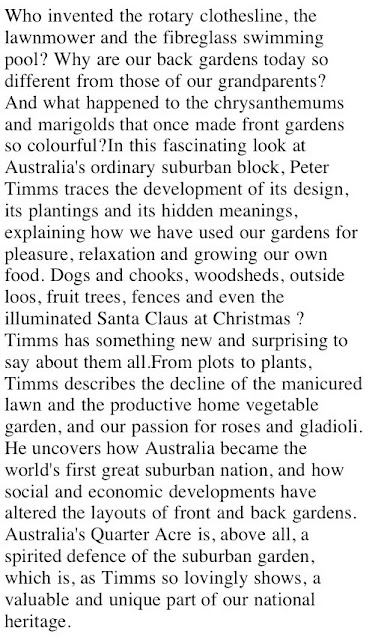Recently, time spent in the wonderful Library at the Botanic Gardens led me to an interesting journal publication
Australian Garden History - where I read an article on the Archeology of the everyday which put forward the idea that not all archeology involves excavation or scientific analysis - garden ephemera such as plant labels and seed packets can yield vital evidence about past horticultural practices.
Also mentioned was the book "Australia's quarter acre" by Peter Timms which was discussed for its examination of the backyard gardening tradition of this country with its chickens and chokos - so commonly replaced now with backyard blitz affairs (almost) straight from the store catalogues. The desire not to cultivate and mow a lawn year after year is an understandable change in thinking....perhaps more options need to be brought forward for consideration of how to best use this precious space.
There is a timely awakening to our collective call to take more notice of the possible gains to be had from growing our own fruits, vegetables, herbs and such. In an earlier post I mentioned the children who are learning from school programs focused on kitchen gardens - complex and critically important learning that is having tremendous results for all concerned. There are stories of children asking to have some space to dig a garden at home, wanting to plant vegetables and eat them... Mothers are in shock !!
Change is inevitable but few of us saw the velocity of change that we would be countering in 2010 nor did we probably imagine decades ago that the United Nations would be prompted to declare 2010 the International Year of Biodiversity.
My grandfather farmed a small, fertile parcel of land in the Manning Valley of NSW in the 1920's through to the 1950's when he handed over to the next generation. Dairy, with produce grown from his own seed saving efforts (+ exchanges with relatives and neighbours) provided a modest sustainable income - the produce being sold in the nearby town. In the Depression era many came looking for work for a meal - and this farm sustained many a visitor as well as those who gravitated to the daily table. As a young child I visited his "farmed" backyard garden with eyes of wonder. He'd retired into town and generated once again a prolific year round source of bounty... with grape vine trellis, a passionfruit vine on the water tank - organic produce and free range eggs - no labels required. From farm to fork indeed!

Re the Peter Timms book - State Library of NSW shop:
Below are images, stories and links to just a few of the many wonderful enterprises dedicated to preserving our seed heritage and ensuring those back yards will be places of bounty. More will be showcased over the year! Meetings are underway and you are warmly invited to add your imput, stories or contacts!
Select Organic seeds come from Beechmont in the South East QLD region of Australia. I attended the huge vibrant annual Brisbane Organic Growers festival late last year and met the Finches who are behind this enterprise which also includes Eden seeds. These websites have links to many similar organisations and businesses. This region has an abundance of committed and innovative people who have worked hard to sustain wonderful intiatives over many years.

These 2 images below are from a keen gardener at WWOOFblog who is studying permaculture and gaining experience through the WWOOF organisation. The seed saving process for heirloom varieties is explained alongside images. This blog has links to many related projects if interested.



This organisation, founded in 1986 at Byron Bay, has managed to successfully mobilise interest all over Australia and spread the word globally. Visit their website for an astonishing fount of information, links and also a blog to follow. Read their story here from their excellent website.
From the archives: Nimbin 1989

From these humble beginnings above to the current reach defined by the article below.
Click on this article above to enlarge for reading.
Michel and Jude Fanton have seen their humble project build to its present international exposure with books and films taking the message far and wide. This blog entry - 24th of january 2010 - details the film showing dates in New York this year.
FORK TO FORK at HERONSWOOD

This Victorian institution DIGGERS is well worth a visit. The slideshow above is from the cafe which runs a fork to fork club. Their wonderful catalogue is shown below.







2 comments:
This is a wonderful post; it's nice to think about understanding garden traditions as a kind of archeology. It's also great that there are more and more people interested in saving seed and in growing their own food. The severe recession here in the US has increased the sales of vegetable seed, which is a good thing to come from a bad situation.
Thankyou Altoon for great comments!
Ive watched with interest on your blog as you order in seed packets and cultivate them in what seems like the depths of winter in readiness for the time to plant them after the thaw.
Given our seasons are not nearly so classic as that here it is a stark reminder watching the seasons through your far northern lens.
Mind you... in this subtropical clime ... observing trees popping with massive seedpods is a sure reminder of nature at work!
People getting back to growing things or buying directly from those who do is something to celebrate indeed. And one cant help but notice the way the community is enlivened in the exchange!
Post a Comment